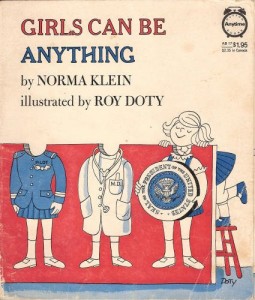Today’s Equally Yoked post is from Jenn LeBow. I think it’s one many Christian couples can relate to.
For months, Dennis has appeared puzzled every time I bring up the issue of complementarianism vs. egalitarianism. He understands the tenets of both positions; his bemusement doesn’t arise from lack of knowledge. Instead, as I read passages aloud from various articles, books, or blogs, he regards me with a slightly confused, good-natured smile, as if he’s asking why we continue to rehash an issue we never even had to debate among ourselves.
 You see, I didn’t encounter the opposing views of complementarianism and egalitarianism until adulthood. Whether it was the influence of growing up in the 1970’s and reading books like Girls Can Be Anything, or coming from a family in which the women had long attended college and pursued careers, it just never occurred to me that anyone would seriously oppose women participating equally in the church. True, I never saw a female pastor in action, but frankly, as a child I never wondered why.
You see, I didn’t encounter the opposing views of complementarianism and egalitarianism until adulthood. Whether it was the influence of growing up in the 1970’s and reading books like Girls Can Be Anything, or coming from a family in which the women had long attended college and pursued careers, it just never occurred to me that anyone would seriously oppose women participating equally in the church. True, I never saw a female pastor in action, but frankly, as a child I never wondered why.
In college, I heard rumblings of gender-based hierarchy, but it seemed to come from the same people who told me that they’d never known you could be a member of the other political party and a Christian, so I dismissed it as ignorance, assuming that as they got to know a wider range of people, they’d see that room exists for many viewpoints.
I took a fair bit of time off from God and the church in the years immediately following college graduation, not returning to active faith and practice until Dennis and I were on the verge of getting married and I realized the solemnity of the vows.
Dennis, therefore, fell in love with me during a secular, career-focused period of my life. One of the things he loved most from the beginning was my self-confidence. He never hoped to “master” me. We showed each other new aspects of life to enjoy: I read aloud to him, and he convinced me that spending time outside was worth prioritizing.
 Throughout our dating years, both of us enjoyed the pattern that developed: we cared for the other person deeply, and strove to please one another. Kindness became our unwritten rule. When we married, continued kindness in close quarters with no easy way out didn’t come as effortlessly. It did, however, seem like the only realistic way forward toward a happy marriage.
Throughout our dating years, both of us enjoyed the pattern that developed: we cared for the other person deeply, and strove to please one another. Kindness became our unwritten rule. When we married, continued kindness in close quarters with no easy way out didn’t come as effortlessly. It did, however, seem like the only realistic way forward toward a happy marriage.
Our first married experience with the idea of submission came about ten years ago in a Young Marrieds group at our church. When one of the wives spoke of the joy she found in placing her husband’s desires before her own, in submitting to him as her authority, I had no idea what to think. I loved these friends, knew them well. If they could think of this practice as helpful and worthwhile, perhaps something good lay within.
I tried for awhile to submit to Dennis, but soon ran into a couple of obstacles. One, Dennis rarely expresses strong preferences. It is harder than one might think to submit to someone as easygoing as he. One of the most sacrificial things I did was place the bed pillows on the bed in the order he preferred rather than following my own preference. Impressive, I know.
Second, Dennis shook off my efforts at times. He seemed to actually prefer it when I spoke my mind. I couldn’t tell if he was mostly confused or annoyed by my newfound timidity in expressing an opinion on which movie to go see or which restaurant to try on a weekend date. I started to wonder: is it still considered submission if your submissive actions bother your husband?
In time, these attempts faded. But the voices trumpeting the differences grew louder. By now, the voices sometimes sound strident on both sides of the argument. Some say there’s no place for women to speak their minds to their husbands; others argue that anything less than complete equality rests on misinterpretation of Scripture.
Dennis and I, a little more than fifteen years into our marriage, have disavowed extremes in many contexts: politics, religion, parenting. But one extreme we do cling to: we still treat each other more kindly than we treat anyone else. Some days, doing so requires more submission than any other task, but it’s always been a mutual submission for us. I see clearly how much patience it takes for Dennis to remain kind with me; my efforts with him don’t require nearly as much strength of will. Nevertheless, we believe it to be among the top three reasons our marriage remains strong.
I have put down the treatises. At times I get a flash of good sense and stop trying to fix what’s never been broken. Or letting anyone else dictate to us what they think our marriage should look like.
 Jenn LeBow is a native Texan; a globe-wanderer thanks to the U.S. State Department; the mom of four (mostly) delightful kids: Cartwheel, 22; Einstein, 11; Blossom, 8; and Ladybug, 4; and a voracious reader. She and Dennis have been married 15 years and now arrange the pillows by preference of the person who actually makes the bed. You can read more at Jenn’s blog, Hang On Baby, We’re Almost… Somewhere, or follow her on Twitter.
Jenn LeBow is a native Texan; a globe-wanderer thanks to the U.S. State Department; the mom of four (mostly) delightful kids: Cartwheel, 22; Einstein, 11; Blossom, 8; and Ladybug, 4; and a voracious reader. She and Dennis have been married 15 years and now arrange the pillows by preference of the person who actually makes the bed. You can read more at Jenn’s blog, Hang On Baby, We’re Almost… Somewhere, or follow her on Twitter.
Next week’s Equally Yoked post is from Gerald Ford (the Christian counselor, not the president).
Want to contribute to the Equally Yoked series? Email Jenny at jennyraearmstrong@gmail.com.
Leave a comment for a chance to win How I Changed My Mind About Women in Leadership: Compelling Stories from Prominent Evangelicals. Winner announced Feb. 1st.

27 Responses to Jenn and Dennis LeBow: “I couldn’t tell if he was mostly confused or annoyed by my newfound submissiveness.”